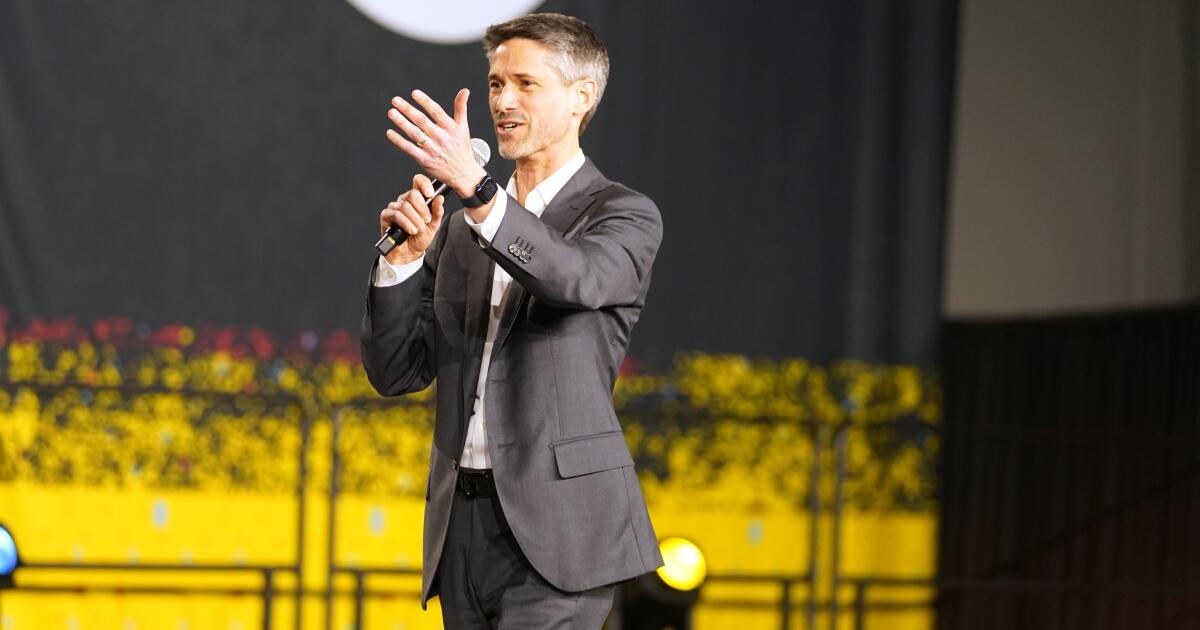Mahan backers fund Super Bowl ads for newest gubernatorial candidate
SACRAMENTO — Only one of the candidates for California governor will appear in a splashy Super Bowl ad on Sunday, though a rival has locked in a valuable spot on Animal Planet’s lighthearted, cuddly “Puppy Bowl” before the big game.
A Silicon Valley-backed independent expenditure committee booked $1.4 million in airtime on NBCUniversal’s Peacock streaming service, which will feature the big game along with NBC, and on other broadcast networks on Sunday to introduce Matt Mahan, the mayor of San José who entered the governor’s race in late January.
A 30-second ad depicts Mahan, a moderate Democrat, as a “fixer of problems” in a big city “just miles from the big game” and touts his record reducing homelessness, building housing and reducing crime.
The ad was produced by a committee run independently of Mahan’s campaign and funded mostly by Silicon Valley executives, including $1 million from Michael Seibel of Y Combinator and $500,000 each from Riot Games co-founder Marc Merrill and his wife, Ashley.
“This Super Bowl ad kicks off our support for Matt Mahan’s run for governor,” said committee spokesman Matt Rodriguez. “His unmatched record on tackling crime, homelessness and housing in San José while focusing on the basics that Californians care about is very different than the old playbook of toxic politics.”
The committee has so far raised more than $3.2 million, according to Rodriguez, who provided the information about the contributors.
Other financial backers include Neil Mehta and Brian Singerman, two Bay Area venture capitalists, along with Paul Wachter, an investor who has advised former Gov. Arnold Schwarzenegger and celebrity figures such as LeBron James and Dr. Dre on their business ventures.
As an independent committee, the group is barred from coordinating with Mahan and his campaign. A spokesperson for Mahan declined to comment on the committee or its game day ad.
Mahan, a moderate Democrat, has broken with Gov. Gavin Newsom on crime and other issues and is pitching himself as a pragmatist who would prioritize results over party politics or fighting with the Trump administration as Newsom has. Mahan’s campaign is not yet required to disclose donations but said it has raised more than $7 million since he entered the race, more than any candidate besides Tom Steyer, a progressive billionaire whose campaign is primarily self-funded.
Steyer, an investor turned climate activist, has already spent more than $27 million on his campaign. Most of that money went to producing and airing ads in which Steyer touts his wins supporting various ballot measures and pledges to break up utility monopolies to lower costs.
His latest ad debuts during Animal Planet’s “Puppy Bowl,” a pregame show that features two teams of adoptable dogs tussling over toys in a model football stadium. In the spot, a Realtor tells a couple that in order to afford a home, they might need to go back in time to 1980, “when the average home in California cost $100,000.”
With a burst of sparks, Steyer appears inside the time-traveling DeLorean from the 1985 film “Back to the Future” and says, “You shouldn’t have to go back in time to afford a home in California.” He then pledges to stop “Wall Street speculators from buying up homes” and pricing out “regular Californians.”
To have a legitimate shot at winning a governor’s race in a state as vast as California, home to some of the nation’s most costly media markets, candidates must raise millions of dollars to air ad campaigns robust enough to introduce themselves to voters or undercut their competitors.
According to campaign finance disclosures, former Rep. Katie Porter raised $6.1 million in 2025, the most of any candidate besides Steyer. But Mahan’s entry into the race has excited the tech and business interests that have until now avoided giving.
“The race is now kicked into gear,” and some candidates who have been fundraising for months — or years — “may find themselves lapped by the Mahan machine,” said Andrew Acosta, a Democratic strategist.
Though tech funders appear to be coalescing around the Silicon Valley mayor, he is “not going to come out of the gate lighting the campaign on fire because no one knows him,” Acosta said. With three months until primary ballots start hitting mailboxes, it’s a challenge for Mahan — though one that could be solved with enough money.
Steyer’s campaign criticized the wave of tech figures flocking to Mahan, saying business titans don’t spend their money without expecting something in return.
“This isn’t charity — it’s an investment so they get richer while everyone else gets priced out of California,” Steyer spokesman Kevin Liao said. “While San José remains the least affordable housing market in the world, Tom Steyer is ready to take on powerful special interests, make billionaires and corporations pay their fair share, and make California affordable for working people.”
With the threat of a proposed billionaire’s tax on California’s November ballot, new restrictions on AI and social media simmering in the Legislature and the impending exit of Gov. Gavin Newsom — who has been a reliable tech ally during his tenure — Silicon Valley leaders have made moves in recent weeks to boost their influence in California politics.
Google co-founder Sergey Brin and a handful of other CEOs recently loaded $35 million into a ballot measure committee and spent some of it on two separate efforts to lower housing costs.
Meta and Google have also ramped up spending on lobbying and super PACs in an effort to elect tech-friendly candidates and fight against AI regulation in statehouses both in California and around the country.
